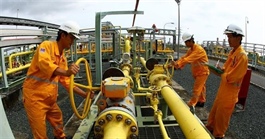State intervention needed to tackle gasoline shortage
State intervention needed to tackle gasoline shortage
The temporary shortage of petroleum supply in the domestic market in recent years mainly stems from rigid management.
Illustrative photo. |
In a talk with Saigon Investment, Asso. Prof. Dr. NGÔ TRÍ LONG, former Deputy Director of the Institute for Price Market Research under the Ministry of Finance, commented that the consequences leading to supply shortage need to be dealt with through State intervention.
JOURNALIST: - Sir, although the domestic gasoline price has decreased compared to the beginning of the year, it is still not satisfying many businesses who say that there is a shortage of gasoline supply. There are also opinions that Decree 95/2021/ND-CP which was amended from Decree 83/2014/ND-CP, and which took effect at the end of last year, is now outdated and needs to be amended and supplemented. What is your opinion on this?
Dr. NGÔ TRÍ LONG: - The inadequacies of Decree 95 have been discussed many times. However, I think that even if we continue to amend and supplement Decree 95, the problems will still be difficult to resolve unless we change the management style and ways of operating the petroleum market today. The problem lies in the operations which involves the human factor. Therefore, it is necessary to change the current rigid operating method by operating more flexibly.
For instance, during the long holidays last week domestic prices of gas remained stationary because they were waiting for the end of the holiday to meet authorities to adjust prices, even though the gasoline prices in the world market fluctuated strongly. This had a negative impact on both consumers and petroleum businesses. Because if the price of gasoline increases, businesses suffer when they still have to sell at a low price, and when the price goes down consumers lose as they have to pay a higher price. This very small detail shows that the current price management mechanism is still rigid and not close to the market reality.
- Sir, in your opinion, should Vietnam let the domestic gasoline price operate according to the world market price?
- For gasoline prices to operate properly according to market prices, it will be very good if the market offers true competition. But right now, we don't have a truly competitive market. In the Competition Law, it is stipulated that one enterprise accounts for 30%, two enterprises account for 50%, and three enterprises account for 60% of the market share of certain type of goods. This is to say that enterprises hold a dominant position in the market and play a very dominant role. When playing a dominant role, there is a need for regulations by the State to avoid market manipulation.
Currently, Petrolimex is accounting for about 47% to 48% of the domestic market share, together with two other petroleum businesses combined, this number accounts for more than 60% of the domestic petroleum market share dominating the market today. When there are enterprises holding such a dominant position in the market, it is never allowed to let the market float or allowing enterprises to set their own prices, especially for key strategic commodities such as petroleum. Because when businesses set their own prices, they will take advantage of their influence to raise prices, causing damage to consumers and other businesses. Therefore, State intervention is required and the State deciding the price is the reasonable option.
- But sir, is this a contradiction in the operating mechanism?
- In my opinion, this is not a contradiction, but rather it is a difficult position of the State. If you want to stay close to the market, you must decide the price on a daily basis, instead of operating according to the current cycle. If it floats, it will be dominated by enterprises. But when it is not possible to float the price of gasoline and businesses and consumers decide for themselves, the State needs to be the arbitrator. Only when the market is fully competitive can it be floated.
Another difficulty here is that when the State has regulated prices, there must be a cycle to adjust. Previously it was from 30 days, then it reduced to 15 days and now it is 10 days. Even the Ministry of Industry and Trade recently wanted to regulate prices every two or three days. I think it is very good to do this, but whether the Ministry of Industry and Trade can do this or not is the question.
One of the criteria to evaluate the market economy is price liberalization. Price liberalization does not mean that everything is determined by the market itself but must depend on each type of product and market. For example, electricity and gasoline are essential commodities and the State plays the role of an arbitrator to adjust and overcome any shortcomings. The management of the market economy is different from the subsidy mechanism.
- Sir, in the past, there have been many opinions that it is necessary to invest in building a strategic petroleum reserve system because this is a factor for preventing price shocks from outside and helping the State operations to run more smoothly. What is your opinion on this?
- Petroleum reserves in Vietnam are now common for nearly ten days and this is a dangerous thing. Currently, many countries can store petroleum for up to three months. There are two types of reserves here, namely, enterprise reserves and state reserves. These two reserves are currently unbalanced, and we only rely on enterprise reserves mainly. The point of view of businesses is that they want to reserve a term of a few days because businesses do not want to put too much capital, but the price often fluctuates, and the risk will be high. But storing for a few days will have implications for energy security as well and overcoming this limitation requires State intervention.
- Thank you very much.



























